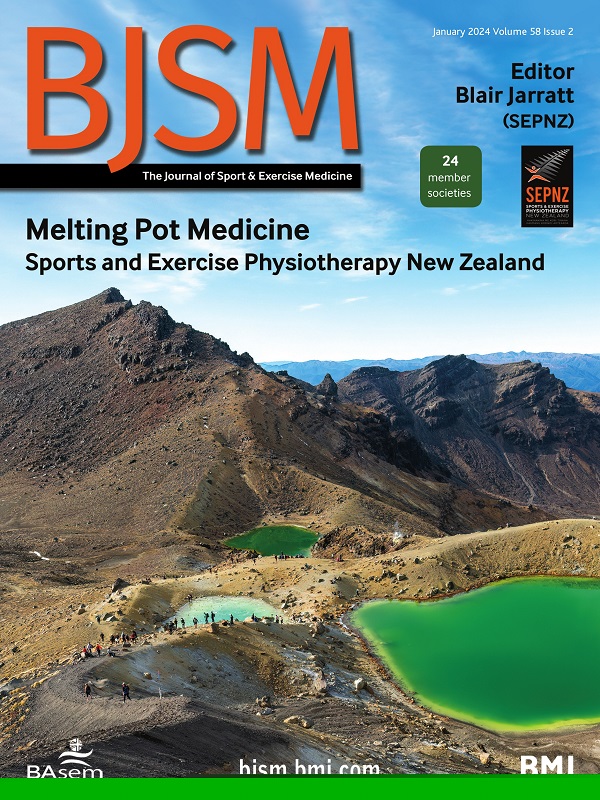ReFORM synthesis of the 6th International Consensus Statement on Concussion in Sport
IF 11.6
1区 医学
Q1 SPORT SCIENCES
引用次数: 0
Abstract
The sixth International Conference on Concussion in Sport took place 27–30 October 2022 in Amsterdam, Netherlands. It followed the fifth International Conference held in Berlin, Germany in October 2016, and aimed to provide updated recommendations regarding the prevention and management of concussions in sport based on the highest level of scientific evidence, the result of several systematic reviews of the literature.1–10 This editorial summarises key processes and recommendations from the Consensus Statement on Concussion in Sport.11 The preparation of these recommendations took several years, followed a robust methodology12 and was presented in a structured format. The organising committee was composed of representatives from international sports federations (Fédération Internationale de l'Automobile, Fédération Equestre Internationale, Fédération Internationale de Football Association, International Ice Hockey Federation, and World Rugby) and the International Olympic Committee. This organising committee proposed Co-Chairs of the Scientific Committee, who are also part of the Concussion in Sport Group (CISG). The Scientific Committee then invited lead authors and suggested coauthors (these recommendations were reviewed and amended by the lead authors) independent of the organising committee who had no input to the scientific process. A modified Delphi technique was used to devise the initial 12 questions that informed the Berlin International Conference on Concussion in Sport which were subsequently revised to 10 questions for the Amsterdam consensus.12 13 Ten themes around concussion were identified and evolved from previous iterations of the statement: prevention strategies, acute evaluation, office assessment, targeted interventions, rest and exercise, clinical recovery, evaluation of persisting symptoms, role of emerging technologies, retirement from sports and long-term effects. For each identified theme, the author group conducted a systematic review following Preferred Reporting Items for Systematic Reviews and Meta-Analyses guidelines, with meta-analyses whenever possible, and then developed recommendations based on the results of these reviews.1–10 These …第六届体育脑震荡国际共识声明的改革综合
第六届体育脑震荡国际会议于2022年10月27日至30日在荷兰阿姆斯特丹举行。在此之前,第五届国际会议于2016年10月在德国柏林举行,旨在根据最高水平的科学证据,即对文献的几次系统回顾的结果,提供有关体育脑震荡预防和管理的最新建议。这篇社论总结了《关于运动中脑震荡的共识声明》的关键过程和建议。11这些建议的准备工作花费了数年时间,遵循了一套可靠的方法12,并以一种结构化的形式呈现。筹委会由国际体育联合会(国际汽车协会、国际马术协会、国际足球协会、国际冰球联合会和世界橄榄球联合会)和国际奥林匹克委员会的代表组成。该组织委员会提议科学委员会的联合主席,他们也是运动脑震荡小组(CISG)的一部分。科学委员会随后邀请主要作者和建议的共同作者(这些建议由主要作者审查和修改)独立于组委会,他们对科学过程没有任何投入。一种改良的德尔菲技术被用来设计最初的12个问题,这些问题被告知了柏林国际运动脑震荡会议,随后被修改为阿姆斯特丹共识的10个问题。12 13围绕脑震荡确定了10个主题,并从以前的声明中不断发展:预防战略、急性评估、办公室评估、有针对性的干预、休息和锻炼、临床康复、持续症状的评估、新兴技术的作用、退出运动和长期影响。对于每个确定的主题,作者小组按照系统评价和荟萃分析指南的首选报告项目进行了系统评价,并尽可能进行荟萃分析,然后根据这些评价的结果提出建议。这些……
本文章由计算机程序翻译,如有差异,请以英文原文为准。
求助全文
约1分钟内获得全文
求助全文
来源期刊
CiteScore
27.10
自引率
4.90%
发文量
217
审稿时长
3-8 weeks
期刊介绍:
The British Journal of Sports Medicine (BJSM) is a dynamic platform that presents groundbreaking research, thought-provoking reviews, and meaningful discussions on sport and exercise medicine. Our focus encompasses various clinically-relevant aspects such as physiotherapy, physical therapy, and rehabilitation. With an aim to foster innovation, education, and knowledge translation, we strive to bridge the gap between research and practical implementation in the field. Our multi-media approach, including web, print, video, and audio resources, along with our active presence on social media, connects a global community of healthcare professionals dedicated to treating active individuals.

 求助内容:
求助内容: 应助结果提醒方式:
应助结果提醒方式:


